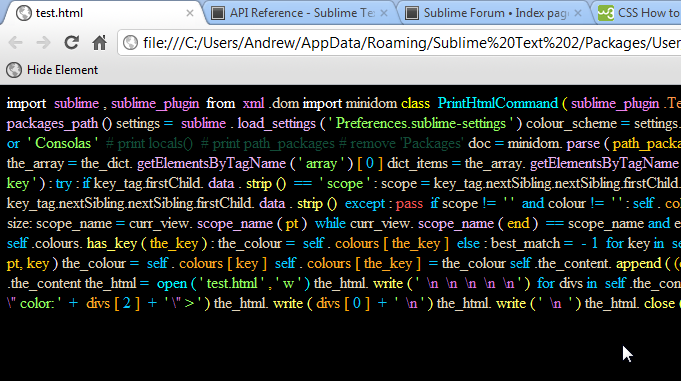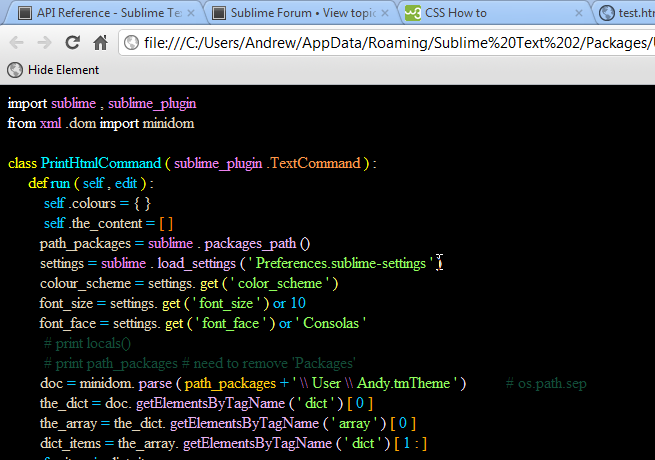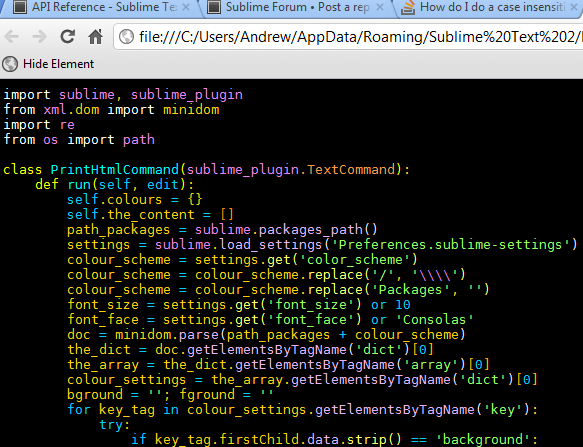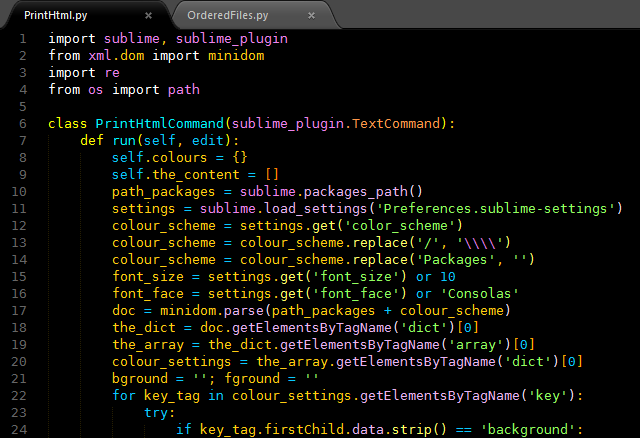This third (final… for the moment!) version should, I believe, work in other oses - but I’m unable to test it.
It’s more memory-efficient, as it writes each line to the file as it progresses, rather than building a potentially huge list (before writing to the file).
It saves the original file extension as part of the new name. So ‘this.js’ becomes ‘this_js_parsed.html’. I believe this to be useful, as it’s common to have different file types having the same filename.
[code]import sublime, sublime_plugin
from xml.dom import minidom
import re
from os import path
class PrintHtmlCommand(sublime_plugin.TextCommand):
def run(self, edit):
self.colours = {}
path_packages = sublime.packages_path()
settings = sublime.load_settings(‘Preferences.sublime-settings’)
colour_scheme = settings.get(‘color_scheme’)
colour_scheme = colour_scheme.replace(’/’, ‘\\’)
colour_scheme = colour_scheme.replace(‘Packages’, ‘’)
font_size = settings.get(‘font_size’) or 10
font_face = settings.get(‘font_face’) or ‘Consolas’
tab_size = settings.get(‘tab_size’) or 4
# padd_bottom = settings.get(‘line_padding_bottom’) or 0
doc = minidom.parse(path_packages + colour_scheme)
the_dict = doc.getElementsByTagName(‘dict’)[0]
the_array = the_dict.getElementsByTagName(‘array’)[0]
colour_settings = the_array.getElementsByTagName(‘dict’)[0]
bground = ‘’; fground = ‘’
for key_tag in colour_settings.getElementsByTagName(‘key’):
try:
if key_tag.firstChild.data.strip() == ‘background’:
bground = key_tag.nextSibling.nextSibling.firstChild.data.strip()
elif key_tag.firstChild.data.strip() == ‘foreground’:
fground = key_tag.nextSibling.nextSibling.firstChild.data.strip()
except:
pass
dict_items = the_array.getElementsByTagName(‘dict’)[1:]
for item in dict_items:
scope = ‘’; colour = ‘’
for key_tag in item.getElementsByTagName(‘key’):
try:
if key_tag.firstChild.data.strip() == ‘scope’:
scope = key_tag.nextSibling.nextSibling.firstChild.data.strip()
elif key_tag.firstChild.data.strip() == ‘foreground’:
colour = key_tag.nextSibling.nextSibling.firstChild.data.strip()
except:
pass
if scope != ‘’ and colour != ‘’:
self.colours[scope] = colour
curr_view = self.view
curr_file = curr_view.file_name()
head, tail = path.split(curr_file)
fname, ext = path.splitext(tail)
ext = ext.replace('.', '_')
the_html = open(head + path.sep + fname + ext + '_parsed.html', 'w')
the_html.write('<html>\n<head>\n<style type=\"text/css\">\n')
the_html.write('\tspan { display: inline; border: 0; margin: 0; padding: 0; }\n')
the_html.write('\tbody { ')
if fground != '': the_html.write('color: ' + fground + ';')
if bground != '': the_html.write(' background-color: ' + bground + ';')
the_html.write(' font: ' + `font_size` + 'pt \"' + font_face + '\", Consolas, Monospace;')
the_html.write('\n}\n')
the_html.write('</style>\n</head>\n<body>\n')
size = curr_view.size()
pt = 0; end = 1
while end <= size:
scope_name = curr_view.scope_name(pt)
while curr_view.scope_name(end) == scope_name and end <= size:
end += 1
region = sublime.Region(pt, end)
the_key = scope_name.strip()
if self.colours.has_key(the_key):
the_colour = self.colours[the_key]
else:
if re.match('source\.[a-zA-Z_]*$', the_key) is not None:
self.colours[the_key] = fground
the_colour = fground
else:
best_match = -1
for key in self.colours:
if curr_view.score_selector(pt, key) > best_match:
best_match = curr_view.score_selector(pt, key)
the_colour = self.colours[key]
self.colours[the_key] = the_colour
tidied_text = curr_view.substr(region)
tidied_text = tidied_text.replace('&', '&')
tidied_text = tidied_text.replace('<', '<')
tidied_text = tidied_text.replace('>', '>')
tidied_text = tidied_text.replace('\t', ' ' * tab_size)
tidied_text = tidied_text.replace(' ' * tab_size, ' ' * tab_size)
tidied_text = tidied_text.replace('\n', '<br>')
the_html.write('<span style=\"color:' + the_colour + '\">')
the_html.write(tidied_text + '</span>')
pt = end
end = pt + 1
the_html.write('</body>\n</html>')
the_html.close()[/code]
I was considering applying your chosen ‘line_padding_top/bottom’, but this requires quite a bit of css manipulation.
What’s the default font for Apple and Linux, etc.? I’ve left it currently as: ‘“Your font”, Consolas, Monospace’.
I’m also considering a version which would retain/generate the line-numbers, but I’ve had no feedback yet. Andy.

 Although platform independent version would be even better…
Although platform independent version would be even better… ; the attached screenshot is an HTML document generated from a keyboard combination from within ST.
; the attached screenshot is an HTML document generated from a keyboard combination from within ST.




 before settling on ‘minidom’ - in particular because it shouldn’t require a separate install. But I don’t know about Linux: perhaps someone with Linux might contribute
before settling on ‘minidom’ - in particular because it shouldn’t require a separate install. But I don’t know about Linux: perhaps someone with Linux might contribute 